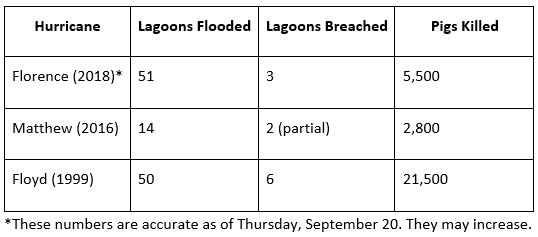
Last week, the Food Integrity Campaign (FIC) warned that Hurricane Florence would wreak havoc on industrial hog facilities in North Carolina, leading to health and environmental disaster. This week, we can confirm those fears. Early counts from the North Carolina Department of Environmental Quality (DEQ) already reflect devastating pollution from hog waste and animal deaths. This data only includes farmers’ own incident reports, as the DEQ staff have not yet been able to make a formal assessment on the ground. Seventy-five lagoons are still at high risk of overflowing.

Two previous hurricanes, Floyd in 1999 and Matthew in 2016, left behind thousands of dead hogs and millions of gallons of hog waste from flooded open-air lagoons. Since 1999, neither state policies nor corporate practices have substantially changed the reality of how large industrial hog farms manage waste. More than 3,000 open-air lagoons full of hog waste were in the path of Hurricane Florence, similar to the number there before Hurricane Floyd.
Although the number of open-air lagoons hasn’t changed, the public is finally paying attention. Just this year, a slew of lawsuits has brought widespread media attention to North Carolina’s dirty hog industry. A jury has ruled that, since the contracting company controls so many aspects raising the pigs, the company should be held accountable for the resulting waste. This summer, the documentary, Eating Animals, put a spotlight on the farmers who blew the whistle on unfair contracting practices that keep farms from making environmental improvements. A lot of people had never heard of overflowing pig lagoons until Florence. Trust us, whistleblowers have been speaking about this issue for years. The difference is that, now, people are finally listening.
Follow FIC on Facebook and Twitter for more news and updates.
Image Credit: Reuters